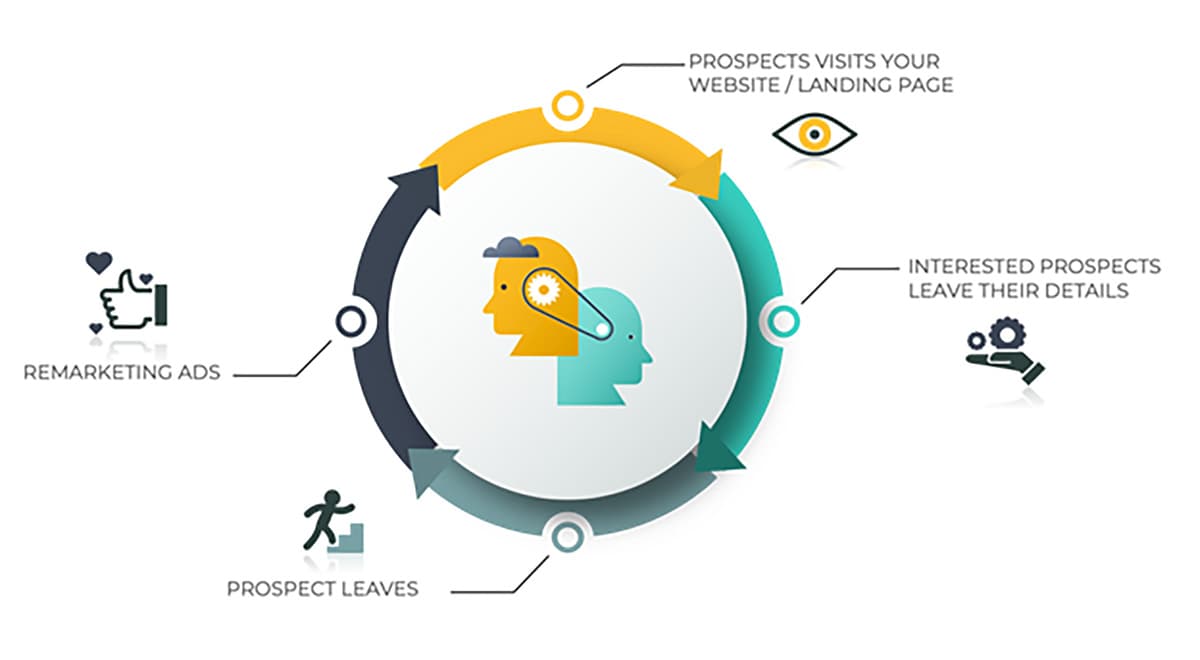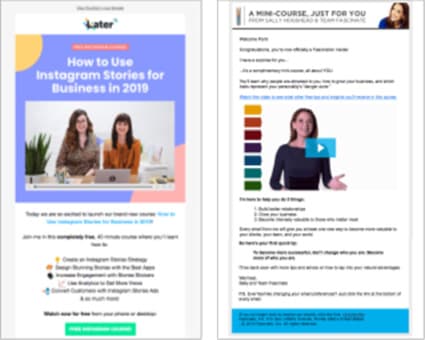Google’s insight team and the Behavioral Architects came up with a new research laying its focus on “the ‘messy middle’, a space of abundant information and unlimited choice (visually depicted with the infinite sign in the image below) that shoppers have learned to manage using a range of cognitive shortcuts.”
Navigating the messy middle with video marketing
Article
That’s true, if we think about it, between the linear “path to purchase” or “purchase funnel”, there is a lot more going on between triggers/awareness and purchase – limited offers, unused/expiring loyalty points, discount codes, credit card promos, push notifications from e-commerce sites, aggregator sites, review sites, comparison sites, group-buying sites, interest groups on social media, moving in and out of multiple e-commerce channels, going back for a second and then a third look, and so on.
A Google study, there are 6 cognitive biases that charge people with an unprecedented speed and scale in decision making:
- Category heuristics – key product specs that simplify decisions.
- Power of now – the longer you wait, the weaker the proposition becomes.
- Social proof – the power of others’ recommendations.
- Scarcity bias – as availability decreases, desire increases.
- Authority bias – trust and expertise can sway decisions.
- Power of free – a free, even unrelated, gift with a purchase is a motivator.
Video marketing
Within this context, videos have been playing an important role due to their inherent nature to transfer information fastest than any other content type. As per the dual coding principle (neuroscience), audio cues give users the ability to retain information of about 10%, on the other hands, with both audio and video cues, users retain as much as 68% of the information. No surprise, 92% of marketers say that video is an integral part of their marketing strategy in 2020. It has grown from 78% in 2015 (HubSpot).
Here are a few video-marketing strategies that can help navigate the messy middle:
Product demo videos
Although they can be a little advertising-ish, they tend to be more functional, highlighting product features, benefits and uses – more effective to close a sale in the journey of exploration and evaluation.
According to Amazon, having a product video is one of the best possible ways to optimize the listing. It’s best to get frontload your USP and keep it succinct, especially in an e-commerce listing scenario, e.g.
- Quechua: https://youtu.be/4uPPlnhOpbk
- Waterdrop: https://youtu.be/e0dwrHo73-E
- NutriBullet: https://youtu.be/XzRwuo_lIWc
That said, product videos can belong too, especially in a high-involvement category, e.g.
- Redsbaby Skip: https://youtu.be/70K9xwKmg_M
And, making them interesting improves likeability, e.g.
- Ikea Place App: https://youtu.be/UudV1VdFtuQ
Product demo videos statistics:
- 97% of global online retail sessions end without a purchase (Statista).
- 96% find videos helpful when making purchase decisions online (Animoto).
- 73% are more likely to purchase after watching videos explaining a product or service (Animoto).
- 71% say watching videos left them with a positive impression of the brand (Animoto).
Explainer videos
At times a new business idea/concept, its features, and benefits need a better explanation to comprehend and appreciate the potential. As the name suggests, explainer videos explain this in a compelling way. They’re informative and a bit advertising-ish, effective at an early conversion stage. It’s mostly placed on the website/landing page; and the more interesting, the better, e.g.
- Dubai Land Department Blockchain: https://youtu.be/sNLIEzXCsNE
- Amazon Launchpad: https://vimeo.com/242753060
- Slack: https://youtu.be/B6zVzWU95Sw
- Dollar Shave Club: https://youtu.be/ZUG9qYTJMsI
Explainer videos statistics:
- A video on a landing page can increase conversions by as much as 80% (Eyeviewdigital).
- People spent on average 2.6x more time on pages with video (Wistia).
- 4x as many people would rather watch a video about a product than read about it (Animoto).
- Video drives a 157% increase in organic traffic from SERPs (Wordstream).
Consumer Testimonial Videos
They act as a social proof reinforcing the claims made by the brand, and adding a layer of reassurance. It optimizes digital marketing efforts by giving that extra push for conversion on your website, social channels and especially on the landing page. Since it’s human-to-human, authenticity is key, e.g.
- Adobe x Limbitless: https://youtu.be/oAbWqWn75Ro
- HubSpot x Surveymonkey: https://youtu.be/Lqhi_XFUZX8
- Liberty Insurance: https://youtu.be/CNR_Cztxxl4
- Salesforce x Burberry: https://youtu.be/jEjXVGTLVag
You may have noted that within the B2B scenario, it can help both brands. Beyond videos, it’s worthwhile to consider positive star ratings and reviews and badges (e.g., an authorized seller, safe checkout, etc.)
Testimonial videos statistics:
- 92% hesitate to hit the buy button if the product lacks reviews entirely (FanandFuel).
- 92% trust a recommendation from a peer and 70% trust a recommendation from someone they don’t even know (Nielsen).
- 91% of millennials trust online reviews as much as friends and family (BrightLocal).
- 79% of people have watched a video testimonial to find out more (Wyzowl).
Case study videos
It’s often utilized by businesses to demonstrate how their offerings have been successfully implemented by their customers. It also helps to show how their product/service can be used. Peppered with storytelling, they can bring their business proposition to life, establishing credibility and supporting SEO.
E.g.: Aggreko has a dedicated page for case-studies for the main verticals, each supported by videos:
- Mining: https://www.aggreko.com/en-au/sectors-and-services/mining
- Events: https://www.aggreko.com/en-pg/sectors-and-services/events
Yes, there’s an element of customer testimonials if the client is featured within the narrative, however case study videos tend to be more data-driven, following the problem-solution-result format, e.g., https://www.hubspot.com/case-studies.
Case study videos statistic:
89% of B2B marketers consider customer testimonials and case studies to be the most effective kinds of content in converting buyers (Fronetics).
Retargeting ADs
Video remarketing is not just impactful, but also a cost-effective way to remind your prospects, who have already interacted with your website and YouTube videos. This is how it works:
While the bounce rates vary from the type of website or industry, as a thumb rule, 26-40% is considered excellent, 41-55% average and 56-70% above average. Doesn’t mean that they are not interested, it’s just a messy middle.
Banners are the most used format; however, YouTube outperforms on greater engagement and visits frequency; it’s a perfect platform coupled with display networks that support video banners.
Video remarketing ads can be of any duration and any of the video types discussed above can be served as YouTube ads, but my personal favorites are the shorter 5-10 seconds ads – as the intent is just a nudge. You’ll note that these are not the cutdowns, but designed to fit the format, e.g.
Singapore Tourism
- Los Angeles: https://vimeo.com/499606310/ffe8c938ab
- New York: https://vimeo.com/501142603/e0671e54f8
- London: https://vimeo.com/501142584/aa6a68bb’/e7
- Toyota Yaris: https://youtu.be/zdKSG67uAAw
- Airbnb: https://youtu.be/adEuRGf6BFA
Retargeting statistics:
- Website visitors who are retargeted are 43% more likely to convert (Criteo).
- 3 out of 5 notice and consider ads showing products they viewed from another page (eMarketer).
- CTR of a retargeted ad is 10x higher than the CTR of a typical display ad (Wishpond).
Videos in email marketing
Embedding video to your email marketing is like adding rocket fuel to email opens, CTR and conversions. With reducing attention spans and impatience to read, it’s often seen to be used either as to a feature on top or part-way through the message, e.g.
Video email marketing statistics:
- Video in emails can improve CTR by up to 300% (Biteable).
- Interactive email letters improve the click-to-open rate by 73% (GetResponse).
- Adding video content to emails can potentially reduce opt-outs by 75%. (Backlinko) .
In conclusion:
Unquestionably there’re many other tactics and formats at play to influence the messy middle and having a good video marketing strategy can meaningfully add value to your prospect’s decision making, thereby having positive overall impact on your business – by revenues, as well as brand equity.
Contact Us
Want our story updates
right into you inbox
By clicking send you'll receive occasional emails from Liwa. You always have the choice to unsubscribe within every email you receive.



